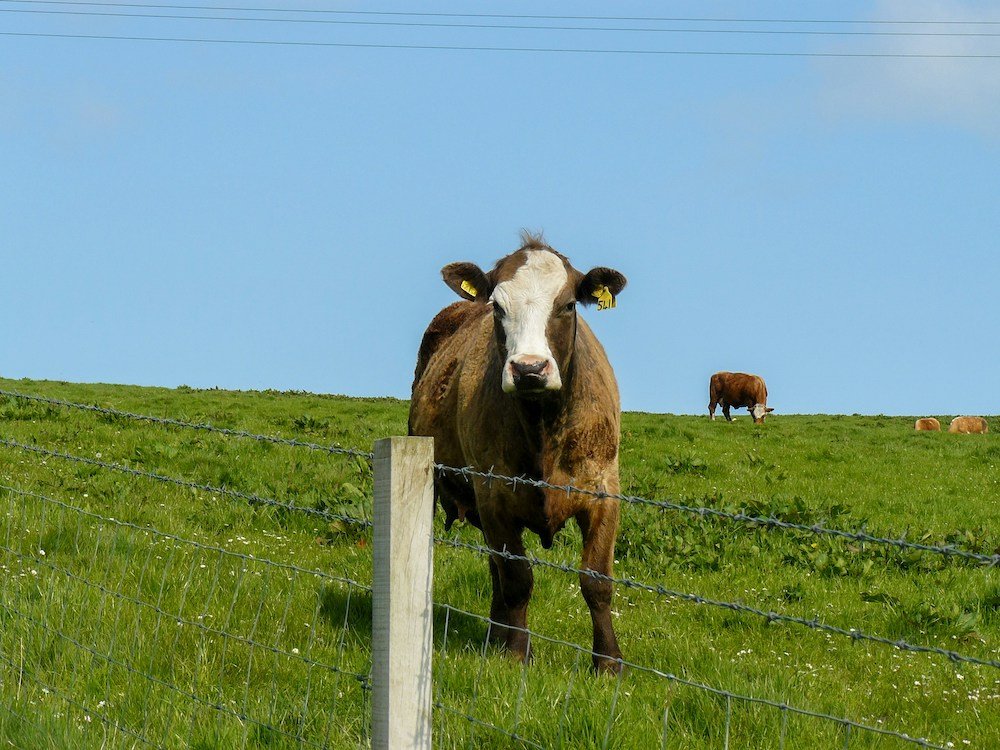
Nestled off the northeastern coast of Scotland lies the captivating archipelago known as the Orkney Islands.
Situated amidst the swirling waters of the North Sea, this cluster of approximately 70 islands boasts a rich tapestry of history, culture, and natural beauty.
The Orkneys are comprised of both inhabited and uninhabited isles, each with its own distinct charm and allure.
Spanning roughly 354 square miles, the Orkney Islands hold a strategic position between the Scottish mainland and Scandinavia, making them a historically significant region.
Evidence of human habitation dates back thousands of years, with Neolithic settlements such as Skara Brae standing as testament to the islands’ ancient heritage.
What Makes the Orkney Islands a Unique Travel Destination
The Orkney Islands beckon travelers with their enchanting blend of ancient ruins, breathtaking landscapes, and welcoming communities.
Here are some highlights that make the Orkneys a must-visit destination:
- Archaeological Marvels: The Orkney Islands are home to some of the best-preserved Neolithic sites in Europe, including the UNESCO World Heritage Sites of Skara Brae, Maeshowe, and the Ring of Brodgar. These ancient wonders offer a glimpse into the lives of our distant ancestors and showcase the island’s rich cultural heritage.
- Stunning Scenery: From rugged cliffs and windswept beaches to rolling green hills and picturesque villages, the Orkneys boast a diverse and captivating landscape. Visitors can explore dramatic coastlines, wander through wildflower-strewn meadows, or simply soak in the tranquility of the island’s remote corners.
- Rich Cultural Heritage: In addition to its prehistoric sites, the Orkney Islands are steeped in Norse and Scottish history. Visitors can delve into the islands’ past at museums and heritage centers, or immerse themselves in traditional Orcadian music, dance, and folklore.
- Abundant Wildlife: The Orkney Islands are a haven for wildlife enthusiasts, offering ample opportunities for birdwatching, seal spotting, and marine wildlife encounters. Visitors may catch sight of puffins, seals, otters, and even orcas along the rugged coastline and pristine waters.
- Warm Hospitality: Despite its remote location, the Orkney Islands are renowned for their warm hospitality and friendly locals. Whether enjoying a meal at a cozy pub, browsing the stalls at a local market, or participating in community events, visitors are sure to feel welcome and embraced by the island’s unique charm.
Getting to the Orkney Islands

Transportation Options
1. Ferry:
- NorthLink Ferries: NorthLink Ferries operate routes from mainland Scotland to the Orkney Islands, with sailings departing from Scrabster near Thurso and Aberdeen. The ferry journey offers stunning views of the coastline and is a popular choice for travelers seeking a scenic and leisurely voyage.
- Pentland Ferries: Pentland Ferries also provide ferry services between Gills Bay on the Scottish mainland and St. Margaret’s Hope in Orkney. Their vessels offer modern amenities and comfortable crossings for passengers and vehicles alike.
2. Plane:
- Loganair: Loganair operates regular flights from various Scottish airports, including Edinburgh, Glasgow, Aberdeen, and Inverness, to Kirkwall Airport, the main airport serving the Orkney Islands. Flights are relatively short and provide a convenient option for travelers looking to reach the islands quickly.
Tips for Planning Your Journey
1. Booking in Advance:
- Whether traveling by ferry or plane, it’s advisable to book tickets well in advance, especially during peak travel seasons. This ensures availability and may also help secure better deals on fares.
2. Flexible Travel Dates:
- Consider being flexible with your travel dates to take advantage of potential discounts or less crowded transport options. Off-peak travel times may offer quieter crossings and more affordable fares.
3. Weather Considerations:
- Be mindful of weather conditions, particularly if traveling by ferry. While Orkney’s maritime climate can be unpredictable, rough seas may occasionally disrupt ferry services. Stay updated on weather forecasts and be prepared for potential delays or cancellations.
4. Transportation on the Islands:
- Upon arrival in Orkney, various transportation options are available for getting around the islands, including rental cars, buses, taxis, and cycling. Rental vehicles should be booked in advance, especially during peak tourist seasons.
5. Pack Essentials:
- Pack essentials for your journey, including any necessary travel documents, medications, and clothing suitable for Orkney’s changeable weather. Don’t forget to bring along a camera to capture the breathtaking scenery along the way!
6. Plan Accommodations:
- Plan your accommodations in advance, especially if visiting during busy periods. The Orkney Islands offer a range of lodging options, including hotels, bed and breakfasts, self-catering cottages, and campsites.
7. Local Knowledge:
- Take advantage of local knowledge and resources when planning your itinerary. Visitor centers, tourism websites, and guidebooks provide valuable insights into attractions, events, and activities across the islands.
8. Respect Nature and Wildlife:
- As you embark on your journey to the Orkney Islands, remember to respect the natural environment and wildlife. Follow designated paths, observe wildlife from a safe distance, and adhere to any conservation guidelines in place.
Accommodation Options

Hotels, Hostels, B&Bs, and Self-Catering Cottages
1. Hotels:
- The Orkney Hotel: Located in Kirkwall, The Orkney Hotel offers comfortable accommodations with modern amenities, including onsite dining options and convenient access to local attractions.
- The Stromness Hotel: Situated in the picturesque town of Stromness, The Stromness Hotel provides cozy rooms and stunning views of the harbor, along with a welcoming atmosphere and friendly staff.
2. Hostels:
- Kirkwall Youth Hostel: Ideal for budget travelers, Kirkwall Youth Hostel offers affordable dormitory-style accommodation in the heart of Kirkwall, with communal facilities and a vibrant atmosphere.
- Stromness Hostel: Overlooking Stromness Harbour, Stromness Hostel provides affordable lodging options for backpackers and solo travelers, with a relaxed ambiance and convenient proximity to local amenities.
3. Bed and Breakfasts (B&Bs):
- The Foveran: Nestled in the countryside near Kirkwall, The Foveran offers charming B&B accommodation with panoramic views of the surrounding landscape, homemade breakfasts, and personalized service.
- Trenabies Bed and Breakfast: Located in the village of St. Margaret’s Hope, Trenabies Bed and Breakfast welcomes guests with comfortable rooms, hearty breakfasts, and a tranquil setting close to local attractions.
4. Self-Catering Cottages:
- Stromness Cottages: Set within walking distance of Stromness town center, Stromness Cottages provide self-catering accommodation options with fully equipped kitchens, cozy living spaces, and private gardens.
- The Smiddy: Situated on the island of Westray, The Smiddy offers self-catering cottages in a scenic coastal location, perfect for families or groups seeking a peaceful retreat amidst nature.
Recommended Accommodations in Different Areas of the Islands
1. Kirkwall:
- The Ayre Hotel: Located near the waterfront in Kirkwall, The Ayre Hotel offers stylish accommodations, a bar and restaurant, and easy access to Kirkwall’s historic sites and amenities.
2. Stromness:
- The Orkney Hotel: As mentioned earlier, The Orkney Hotel in Stromness provides comfortable lodging options with scenic views of the harbor and convenient access to local shops, restaurants, and attractions.
3. Rural Areas:
- The Foveran: For those seeking a tranquil retreat in the countryside, The Foveran offers peaceful accommodations amidst rolling hills and farmland, just a short drive from Kirkwall.
4. Island Retreats:
- The Smiddy: On the island of Westray, The Smiddy provides self-catering cottages in a secluded coastal setting, ideal for travelers looking to explore the island’s rugged beauty and rich wildlife.
Top Attractions and Landmarks

Historic Sites
1. Skara Brae:
- Location: Bay of Skaill, Mainland Orkney
- Description: Skara Brae is a remarkably well-preserved Neolithic village, dating back over 5,000 years. Explore the ancient stone dwellings, passages, and artifacts, offering insights into prehistoric life in Orkney.
2. Maeshowe:
- Location: Stenness, Mainland Orkney
- Description: Maeshowe is a Neolithic chambered cairn renowned for its Viking graffiti and astronomical significance. Venture inside to discover its ancient burial chambers and marvel at the intricately carved runes left by Norse visitors.
3. Ring of Brodgar:
- Location: Stenness, Mainland Orkney
- Description: The Ring of Brodgar is a magnificent stone circle and henge monument, dating back to the Neolithic era. Admire the impressive standing stones and soak in the mystical atmosphere of this ancient ceremonial site.
Natural Wonders
1. Old Man of Hoy:
- Location: Island of Hoy
- Description: The Old Man of Hoy is a striking sea stack rising dramatically from the ocean, standing over 450 feet tall. Marvel at this iconic landmark, sculpted by the forces of nature over millennia.
2. Yesnaby Cliffs:
- Location: West Mainland, Orkney
- Description: The Yesnaby Cliffs offer breathtaking coastal vistas and dramatic rock formations, sculpted by the relentless waves of the North Atlantic. Explore scenic walking trails and observe seabird colonies nesting along the cliffs.
3. Hoy Hills:
- Location: Island of Hoy
- Description: The Hoy Hills boast rugged terrain and sweeping vistas, making them a paradise for hikers and outdoor enthusiasts. Ascend Ward Hill, the highest peak in Orkney, and enjoy panoramic views of the surrounding islands and seascape.
Museums and Cultural Experiences
1. Orkney Museum:
- Location: Kirkwall, Mainland Orkney
- Description: The Orkney Museum showcases the rich history and heritage of the Orkney Islands, featuring archaeological artifacts, maritime exhibits, and displays on local folklore and traditions.
2. Stromness Museum:
- Location: Stromness, Mainland Orkney
- Description: Stromness Museum offers insights into the maritime history and natural environment of Orkney, with collections ranging from geological specimens to maritime artifacts and local artworks.
Unique Experiences
1. Wildlife Watching:
- Description: Orkney is home to a diverse array of wildlife, including seabirds, seals, otters, and even orcas. Embark on guided wildlife tours or explore nature reserves and coastal habitats for unforgettable encounters with Orkney’s native fauna.
2. Island Hopping:
- Description: Explore the Orkney Islands’ diverse landscapes and attractions by embarking on an island-hopping adventure. Discover hidden gems, remote beaches, and historic sites across the archipelago, each offering its own unique charm and allure.
Exploring Orkney’s Cuisine
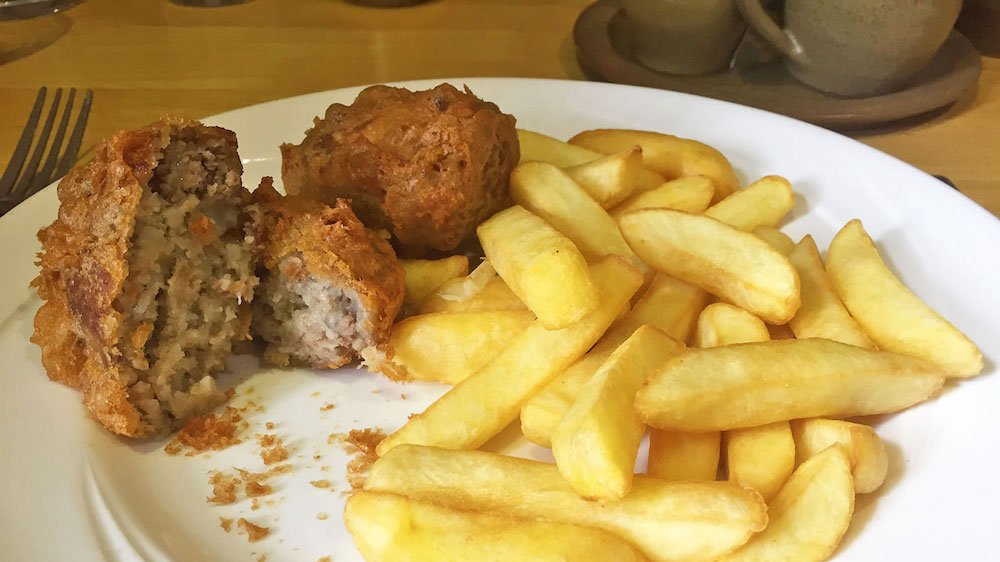
Traditional Orkney Dishes and Ingredients
1. Orkney Beef:
- Renowned for its quality and flavor, Orkney beef is raised on the lush pastures of the islands, resulting in tender, succulent meat prized by chefs and food enthusiasts alike.
2. Orkney Lamb:
- Orkney lamb is celebrated for its rich, distinctive taste, reflecting the islands’ pristine natural environment and traditional farming practices.
3. Orkney Cheese:
- Orkney boasts a thriving dairy industry, producing a variety of artisanal cheeses, including Orkney Cheddar and Orkney Smoked Cheese, renowned for their creamy texture and robust flavors.
4. Orkney Seafood:
- With its rich marine resources and pristine waters, Orkney offers an abundance of fresh seafood, including scallops, lobsters, crabs, and haddock, enjoyed in a variety of traditional and contemporary dishes.
5. Beremeal:
- Beremeal, a type of barley flour unique to Orkney, is used in traditional Orcadian baking, producing hearty breads, bannocks, and oatcakes with a distinctively nutty flavor and dense texture.
Recommended Restaurants and Cafés
1. The Foveran Restaurant (Kirkwall):
- Located at The Foveran Guest House, this award-winning restaurant offers a seasonal menu featuring locally sourced ingredients, including Orkney beef, lamb, and seafood, prepared with creative flair and attention to detail.
2. Helgi’s (Kirkwall):
- Helgi’s is a popular café and bistro in Kirkwall, serving up a tempting selection of Orcadian specialties, homemade cakes, and artisanal coffees in a relaxed and welcoming atmosphere.
3. Stromness Hotel Restaurant (Stromness):
- The Stromness Hotel Restaurant showcases the best of Orkney’s culinary delights, with a menu highlighting fresh seafood, locally reared meats, and seasonal produce, served against the backdrop of Stromness Harbour.
4. The Creel (St Margaret’s Hope):
- The Creel is a charming seafood restaurant overlooking St. Margaret’s Hope harbor, offering a mouthwatering array of freshly caught fish and shellfish, prepared using traditional Orcadian recipes and contemporary cooking techniques.
5. The Orkney Brewery (Quoyloo):
- For a taste of Orkney’s brewing heritage, visit The Orkney Brewery, where you can sample a selection of handcrafted ales and beers, paired with hearty pub fare and panoramic views of the surrounding countryside.
Outdoor Activities and Adventures

Hiking Trails and Walking Routes
1. The Orkney Walking Festival:
- Join the annual Orkney Walking Festival to explore a variety of guided walks and hikes across the islands, ranging from coastal trails and cliff-top paths to historical routes and nature reserves.
2. Hoy Hills and Ward Hill:
- Embark on a trek across the rugged terrain of Hoy Hills, culminating in the ascent of Ward Hill, Orkney’s highest peak. Enjoy panoramic views of the surrounding islands and seascape from the summit.
3. Orphir Circular Walk:
- Discover the scenic beauty of Orphir with the Orphir Circular Walk, meandering through rolling farmland, along tranquil lochs, and past historic landmarks such as the Orkneyinga Saga Centre.
Birdwatching and Wildlife Spotting
1. RSPB Nature Reserves:
- Explore the RSPB nature reserves dotted across the Orkney Islands, including Marwick Head, Hobbister, and Birsay Moors, where you can observe a diverse array of bird species, including puffins, fulmars, and Arctic terns.
2. Hoy Seabird Cliffs:
- Journey to the island of Hoy to witness the awe-inspiring spectacle of the Hoy Seabird Cliffs, home to one of the largest seabird colonies in the United Kingdom, including guillemots, razorbills, and kittiwakes.
3. Seal Watching Trips:
- Embark on a guided boat tour to spot seals and other marine wildlife basking on rocky outcrops and secluded beaches around the Orkney coastline. Keep your eyes peeled for playful seals, basking sharks, and even pods of dolphins.
Water-Based Activities
1. Sea Kayaking:
- Explore Orkney’s pristine coastline and sheltered bays by sea kayak, with guided tours and rental options available for all skill levels. Paddle past sea caves, arches, and sea stacks, and keep an eye out for seals, seabirds, and other marine life.
2. Sailing Excursions:
- Set sail on a sailing excursion around the Orkney Islands, navigating tranquil waters and exploring hidden coves and secluded anchorages. Join a guided sailing trip or charter your own yacht for a truly unforgettable maritime adventure.
3. Wild Swimming:
- Brave the invigorating waters of the Orkney coastline for a wild swimming experience like no other. Discover secluded beaches, natural rock pools, and crystal-clear waters, surrounded by breathtaking scenery and abundant wildlife.
Events and Festivals
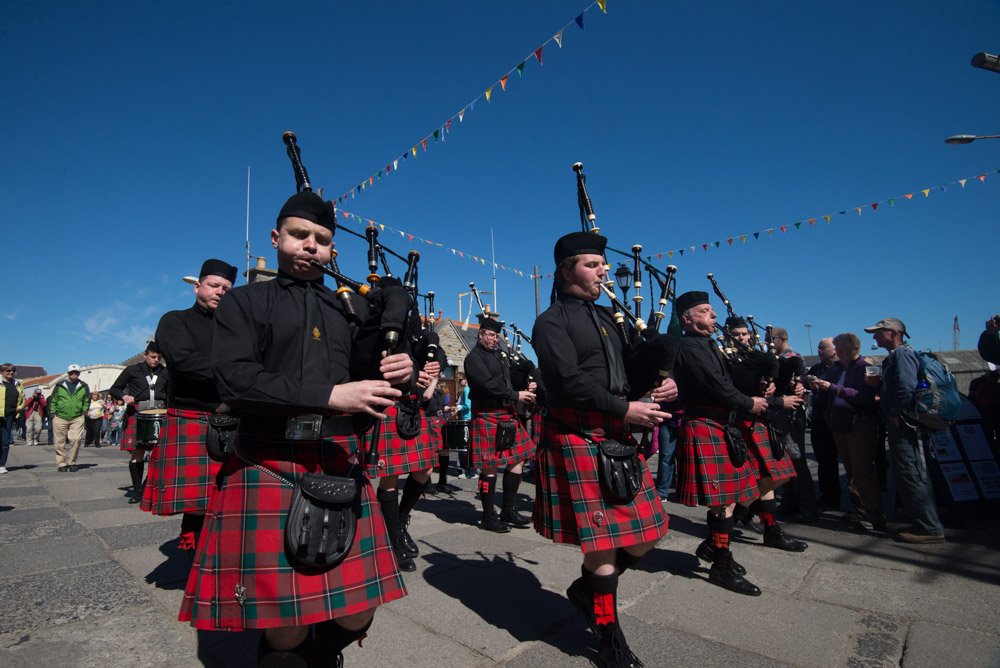
Orkney’s Annual Festivals and Events
1. Orkney Folk Festival:
- Held annually in May, the Orkney Folk Festival celebrates the islands’ rich musical heritage with a diverse lineup of traditional and contemporary folk music performances, workshops, and ceilidhs held across various venues.
2. St. Magnus International Festival:
- The St. Magnus International Festival takes place in June and is one of Scotland’s most prestigious arts festivals, featuring classical music concerts, opera performances, theater productions, and literary events inspired by the life and legacy of St. Magnus, Orkney’s patron saint.
3. Orkney Science Festival:
- The Orkney International Science Festival, held annually in September, offers a fascinating program of lectures, workshops, and hands-on activities exploring scientific discoveries, environmental issues, and technological innovations.
4. Orkney Nature Festival:
- Celebrated in May, the Orkney Nature Festival showcases the islands’ natural wonders and biodiversity through guided walks, wildlife tours, photography competitions, and interactive workshops focusing on conservation and environmental stewardship.
Best Times to Visit for Specific Events
1. Spring (May):
- May is an ideal time to visit Orkney for the Orkney Folk Festival and Orkney Nature Festival, offering opportunities to immerse yourself in the islands’ vibrant culture and natural beauty amidst the blossoming spring landscape.
2. Summer (June):
- June brings the St. Magnus International Festival to Orkney, attracting artists, musicians, and cultural enthusiasts from around the world for a month-long celebration of music, arts, and literature against the backdrop of the islands’ stunning scenery.
3. Autumn (September):
- September marks the Orkney Science Festival, providing a stimulating blend of scientific discovery and exploration for visitors of all ages, with events and activities designed to educate, inspire, and engage curious minds.
4. Year-round:
- While certain festivals are seasonal, Orkney’s calendar is filled with events and cultural happenings year-round, including art exhibitions, craft fairs, agricultural shows, and traditional ceilidhs, offering visitors a glimpse into the islands’ vibrant community spirit and rich cultural heritage.
Practical Tips for Visitors
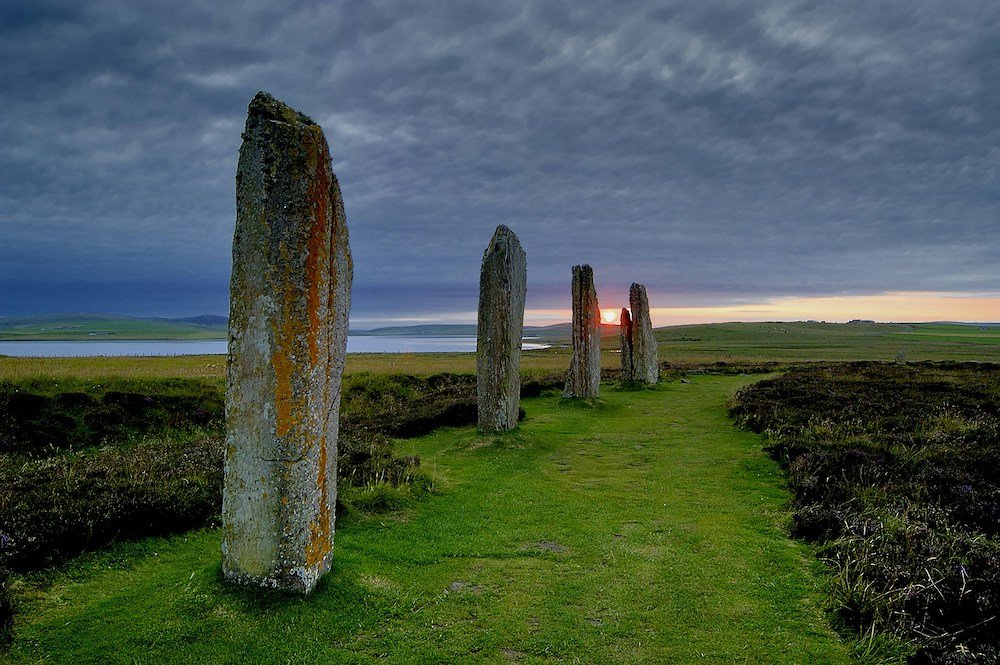
Weather Considerations and What to Pack
- Variable Weather: Orkney’s weather can be unpredictable, with frequent changes throughout the day. It’s advisable to pack layers, including waterproof clothing, sturdy footwear, and sunscreen, to be prepared for varying conditions.
- Wind and Rain: Be prepared for strong winds and occasional rain showers, especially if exploring coastal areas or embarking on outdoor activities. A windproof jacket and waterproof trousers can help keep you dry and comfortable.
- Sun Protection: Despite its northern latitude, Orkney can experience sunny days, particularly in the summer months. Don’t forget to pack sunglasses, a wide-brimmed hat, and sunscreen to protect against UV exposure.
Transportation Tips Within the Islands
- Car Rental: Renting a car is a convenient way to explore the Orkney Islands, offering flexibility and access to remote attractions. Book your rental vehicle in advance, especially during peak tourist seasons, and familiarize yourself with local driving regulations.
- Public Transport: Orkney’s public bus network provides transportation between major towns and villages on the islands. Check timetables and routes in advance, as services may be limited, particularly in rural areas and on Sundays.
- Cycling: Cycling is a popular way to explore Orkney’s scenic landscapes and historic sites. Rent a bike locally or bring your own, and follow designated cycling routes and trails to discover hidden gems off the beaten path.
Safety Guidelines and Emergency Contacts
- Coastal Safety: Take care when exploring Orkney’s rugged coastline, cliffs, and beaches. Pay attention to warning signs and tidal information, and avoid venturing too close to the edge of cliffs or unstable rock formations.
- Emergency Contacts: In case of emergency, dial 999 for police, fire, or medical assistance. Orkney has hospitals and medical facilities in Kirkwall and Stromness, along with local doctors and pharmacies throughout the islands.
- Outdoor Safety: If engaging in outdoor activities such as hiking, birdwatching, or water-based adventures, inform someone of your plans and expected return time. Be prepared with adequate supplies, including food, water, navigation tools, and first aid supplies.
Sustainable Travel Practices
- Respect Nature: Help preserve Orkney’s natural environment and wildlife by following designated paths, avoiding littering, and refraining from disturbing wildlife or nesting birds.
- Support Local Businesses: Choose eco-friendly accommodations, dine at restaurants serving locally sourced ingredients, and support artisans and small businesses producing authentic Orcadian goods and crafts.
- Reduce Carbon Footprint: Consider minimizing your carbon footprint by using public transportation, carpooling, or cycling whenever possible, and reducing energy consumption during your stay.
Cultural Etiquette and Local Customs

Respectful Behavior Towards Locals and Traditions
- Friendly Demeanor: Orkney Islanders are known for their warm hospitality and friendly demeanor. Greet locals with a smile and engage in polite conversation, demonstrating appreciation for their community and culture.
- Respect for Traditions: Show respect for Orkney’s rich heritage and traditions, including its Norse and Scottish influences, by participating in local customs, festivals, and events with an open mind and a willingness to learn.
- Conservation of Sites: When visiting historic sites, archaeological sites, and natural landmarks, observe posted signs and guidelines, refrain from littering or damaging the environment, and leave the area as you found it to preserve its beauty for future generations.
Understanding the Orkney Way of Life
- Strong Sense of Community: Orkney’s close-knit communities value cooperation, mutual support, and a strong sense of belonging. Take time to engage with locals, attend community events, and learn about the island’s history and traditions.
- Connection to the Land and Sea: Orkney’s way of life is deeply rooted in its natural environment, with fishing, farming, and maritime industries playing integral roles in the island economy and culture. Respect the islanders’ connection to the land and sea, and appreciate the importance of sustainable practices and environmental stewardship.
- Appreciation for Arts and Crafts: Orkney has a rich artistic and craft heritage, with local artisans producing traditional Orcadian goods such as jewelry, textiles, pottery, and artwork. Support local artists and craftsmen by purchasing authentic Orkney-made souvenirs and gifts.
- Celebration of Language and Music: Orcadians take pride in their unique dialect and musical traditions, which reflect the islands’ cultural heritage and Norse influences. Embrace the opportunity to learn about Orkney’s language and music through local performances, storytelling, and cultural events.
Conclusion
In this comprehensive guide, we have explored the enchanting allure of the Orkney Islands, from its ancient Neolithic sites and stunning landscapes to its vibrant cultural heritage and warm hospitality.
Key points to remember when planning your visit to the Orkneys include:
- Rich History and Heritage: The Orkney Islands boast a wealth of archaeological treasures, including Skara Brae, Maeshowe, and the Ring of Brodgar, offering a fascinating glimpse into the lives of our Neolithic ancestors.
- Natural Beauty: From dramatic sea cliffs and windswept beaches to rolling green hills and tranquil lochs, the Orkneys’ diverse landscapes captivate visitors with their timeless beauty and rugged charm.
- Cultural Experiences: Immerse yourself in Orkney’s vibrant cultural scene, from traditional music and dance to local festivals and arts events that celebrate the islands’ unique identity and heritage.
- Outdoor Adventures: Explore the Orkney Islands’ pristine wilderness and abundant wildlife through hiking, birdwatching, kayaking, and sailing, offering unforgettable experiences amidst nature’s splendor.
- Warm Hospitality: Experience the warmth and friendliness of Orcadian hospitality, as you encounter welcoming locals, enjoy delicious cuisine made from locally sourced ingredients, and discover the true essence of island life.
As you embark on your journey to the Orkney Islands, prepare to be enchanted by the timeless beauty, rich history, and welcoming spirit that await you.
Whether you’re seeking adventure, relaxation, or a deeper connection with nature and culture, the Orkneys offer a truly unforgettable experience that will leave a lasting impression.
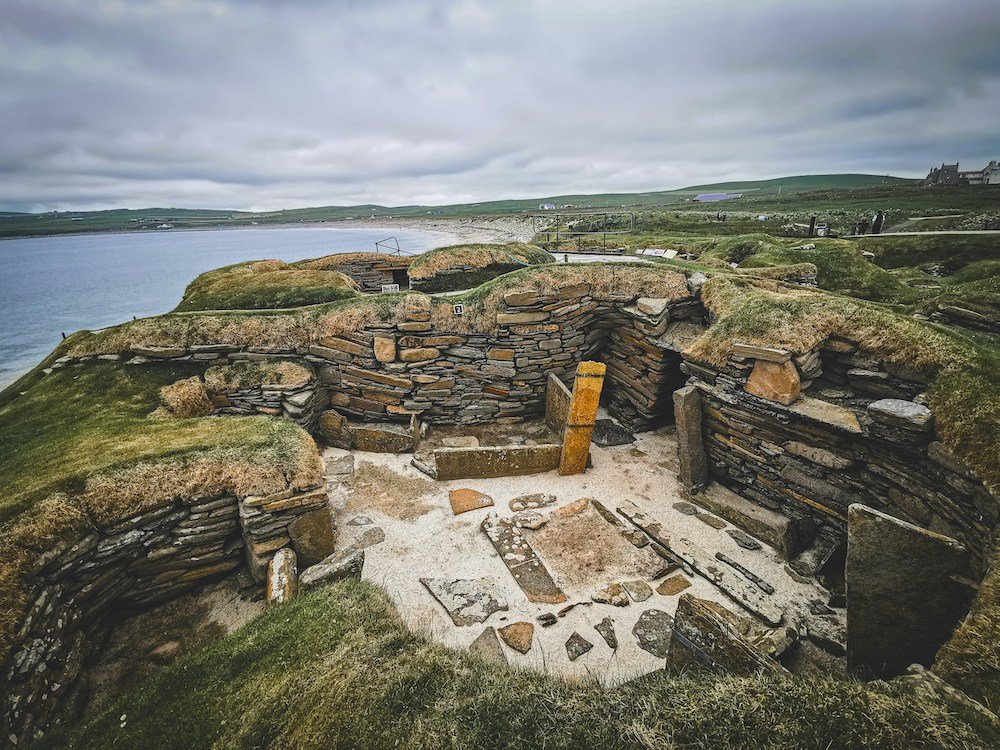
FAQ’s About the Orkney Islands:
What is special about the Orkney Islands?
The Orkney Islands are special for numerous reasons.
One of the most notable features is their rich archaeological heritage, boasting Neolithic sites such as Skara Brae, Maeshowe, and the Ring of Brodgar, which offer remarkable insights into prehistoric life.
Additionally, the islands are renowned for their stunning natural landscapes, including rugged coastlines, sweeping moors, and picturesque villages.
The Orkneys also have a vibrant cultural scene, with traditional music, arts, and festivals that celebrate the islands’ unique identity and heritage.
What language do they speak in the Orkney Islands?
The primary language spoken in the Orkney Islands is English.
However, Orcadian dialects influenced by Norse and Scottish Gaelic can still be heard, adding to the islands’ rich linguistic tapestry.
Are the Orkney Islands expensive?
The cost of visiting the Orkney Islands can vary depending on factors such as accommodation, dining, and activities.
While some aspects of travel in Orkney may be more expensive due to its remote location, there are also budget-friendly options available, such as self-catering accommodations and exploring natural attractions.
Overall, with careful planning, visitors can enjoy the Orkneys without breaking the bank.
What country owns the Orkney Islands?
The Orkney Islands are part of Scotland and are governed by the United Kingdom.
Why aren’t there trees on Orkney?
The lack of trees on the Orkney Islands is primarily attributed to historical deforestation, climate conditions, and soil composition.
Over centuries, the islands’ forests were cleared for agriculture, fuel, and construction materials.
Additionally, the harsh maritime climate and exposure to strong winds limit the growth of trees, making it challenging for them to establish and thrive.
What is the best month to visit Orkney?
The best month to visit Orkney depends on personal preferences and interests.
However, many visitors find that the summer months, from June to August, offer mild temperatures, long daylight hours, and a chance to experience festivals and outdoor activities.
Spring and early autumn can also be delightful times to visit, with fewer crowds and opportunities to witness migrating birds and blooming wildflowers.
How many days do you need on Orkney?
The duration of a visit to Orkney depends on individual interests and the desired pace of exploration.
Many visitors find that spending at least three to five days allows ample time to explore the main attractions, historic sites, and natural landscapes across the islands.
However, shorter visits can still offer memorable experiences, while longer stays provide opportunities for deeper immersion in Orkney’s culture and heritage.
Do they speak English in Orkney?
Yes, English is the predominant language spoken in Orkney, serving as the primary means of communication among residents and visitors alike.
How long is the ferry crossing to Orkney?
The ferry crossing to Orkney can vary depending on the route and departure point.
For example, the NorthLink Ferries service from Scrabster (near Thurso) to Stromness typically takes around 90 minutes to two hours, while the service from Aberdeen to Kirkwall can take approximately six to seven hours. Ferry schedules may also be subject to change due to weather conditions and other factors.
